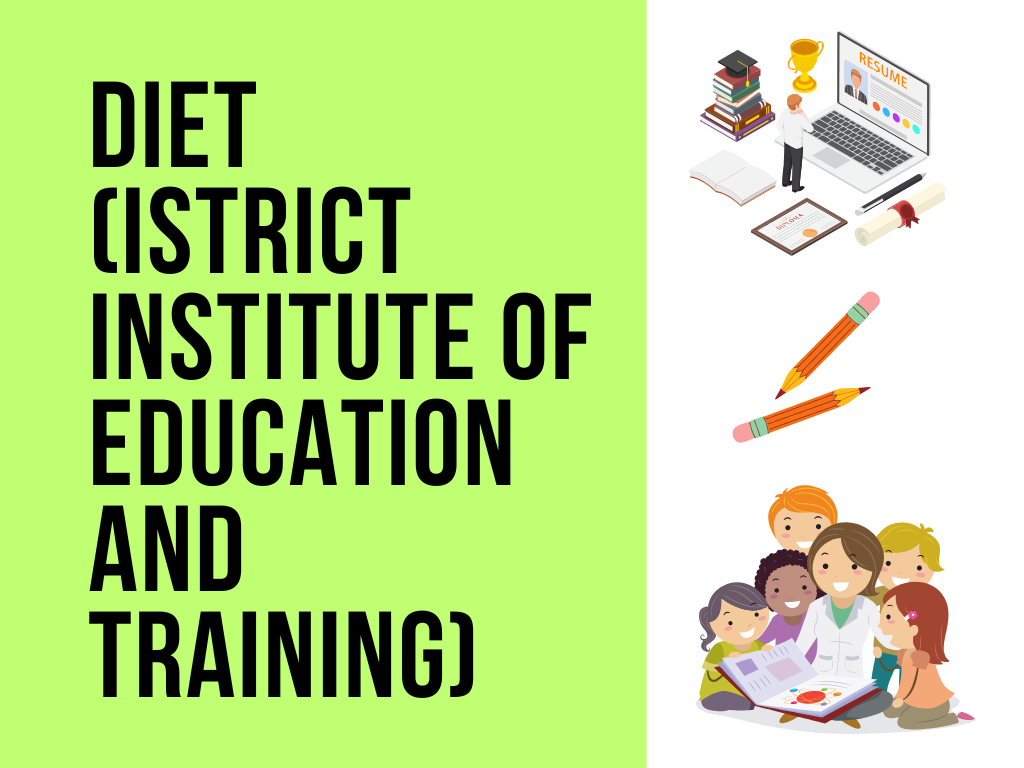DIET (District Institute of Education and Training) is a state-level agency in India that plays a crucial role in teacher education and professional development. Established in the 1980s as part of the national education policy, DIETs aim to enhance the quality of education and promote teacher training at the district level.
Here are some key details about DIET (District Institute of Education and Training):
- Objective: The primary objective of DIETs is to provide academic and resource support to elementary education institutions in the district. They focus on improving the quality of teaching and learning processes, curriculum development, research, and innovation in pedagogy.
- Structure and Location: Each district in India typically has a DIET, which serves as a nodal agency for teacher education in that particular region. DIETs are government-funded institutions and are affiliated with the State Council of Educational Research and Training (SCERT). They are usually located within the district headquarters and serve as a hub for educational activities.
- Collaboration and Coordination: DIETs work in close collaboration with other educational institutions and agencies at the district and state level. They coordinate with the SCERT, State Government Education Departments, Block Resource Centers (BRCs), Cluster Resource Centers (CRCs), and other educational bodies to implement educational policies and programs effectively.
Functions of DIET :
District Institute of Education and Training (DIET) serves several functions related to teacher education and educational development at the district level. While the specific functions may vary slightly between states in India, here are some common functions performed by DIETs:
- Pre-Service Teacher Education: DIETs offer pre-service teacher education programs, such as Diploma in Elementary Education (D.El.Ed) or Bachelor of Education (B.Ed) in some states. These programs prepare aspiring teachers for elementary and primary schools by providing them with the necessary knowledge and skills.
- In-Service Teacher Training: DIETs organize and conduct various in-service teacher training programs and workshops. These programs focus on enhancing the pedagogical skills, subject-specific knowledge, and teaching methodologies of in-service teachers. The training may cover topics like classroom management, effective teaching strategies, educational technology integration, and inclusive education.
- Curriculum Development and Adaptation: DIETs play a role in developing and adapting the curriculum for elementary education. They contribute to the design and development of curriculum frameworks, textbooks, and instructional materials. DIETs align the curriculum with national and state-level educational policies and reforms.
- Action Research and Innovations: DIETs promote action research among teachers to improve the teaching-learning process. They encourage teachers to conduct small-scale research projects, explore innovative teaching methods, and share their findings with other educators. DIETs often provide guidance and support in conducting research and implementing innovative practices in classrooms.
- Resource Center: DIETs function as resource centers for teachers and educational institutions in the district. They provide teaching aids, reference materials, and other educational resources to teachers. DIETs also facilitate the exchange of best practices and educational resources among schools and teachers within the district.
- Evaluation and Monitoring: DIETs play a role in evaluating and monitoring the quality of education in the district. They conduct assessments, examinations, and evaluations to gauge the learning outcomes of students. DIETs may also monitor the implementation of educational programs and initiatives in schools, providing feedback and recommendations for improvement.
- Collaboration and Networking: DIETs collaborate with various stakeholders in the education sector, including schools, government departments, non-governmental organizations (NGOs), and community organizations. They facilitate partnerships and networking opportunities for teachers and educational institutions to share knowledge, resources, and experiences.
- Community Engagement: DIETs engage with local communities, parents, and other stakeholders to promote community participation in education. They organize workshops, awareness campaigns, and initiatives to involve the community in the educational process. DIETs may also conduct parent-teacher meetings and community-oriented programs to strengthen the bond between schools and the local community.
These functions collectively contribute to the overall improvement of teacher education, professional development, and educational quality at the district level. However, it’s important to note that the specific functions and programs offered by DIETs may vary between states in India based on their individual policies and guidelines.
It’s important to note that the specific structure, functions, and programs offered by DIETs may vary slightly between states in India, as education is primarily a state subject in the country. Therefore, it’s advisable to refer to the specific DIET guidelines and policies of the respective state for accurate and up-to-date information.
Also Read : PWD act 1995

Also Visit: Prep with Harshita


Your articles are extremely helpful to me. Please provide more information! http://www.hairstylesvip.com